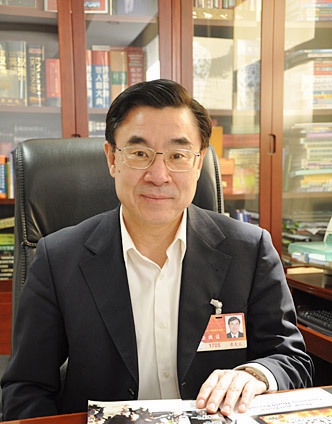China's political sessions: neither rubber stamp nor talk shop
- By Wu Jin
 0 Comment(s)
0 Comment(s) Print
Print E-mail China.org.cn, March 5, 2012
E-mail China.org.cn, March 5, 2012
Veteran Chinese People's Political Consultative Conference (CPPCC) member Huang Youyi argues that the Chinese political sessions that started on Saturday, namely the National People's Congress (NPC) and CPPCC, are more than rubber stamping and a talk shop.
 |
|
Huang Youyi, a CPPCC member and vice president of the China International Publishing Group (CIPG). [File photo] |
"If we have to say how powerful the NPC is, you have to judge it within the Chinese context," says Huang. He articulates his points with a metaphor, saying, one cannot be judged on their chopstick skills by being served Western dishes.
"If you try to transplant it, place it, judge it, in the Western context, then you will come to a different supposition."
Condensed meetings
NPC and CPPCC are two important political sessions held annually in March, when thousands of deputies gather in Beijing, capital of the country, to submit proposals, question governments and make decisions.
Yet the two-week annual political event is too condensed if compared with the West's monthly parliamentary sessions. "It is different from Western parliaments, which are almost in session every day, maybe 200 days a year. Here, the NPC is only two weeks; they can only manage to do very few things," Huang says.
However, they are by no means less influential. Having been nominated as a CPPCC member five years ago, Huang believes the influence of the sessions depend on individual efforts: "If you work hard and are very active, then you can really make a difference."
Loud voices
Only a few years ago, Huang, a top translator and executive in China International Publishing Group (CIPG) was annoyed by the fractured English phrases and sentences scattered in official documents and government reports.
According to him, that was against the law established in the 1950s that protects the Chinese language context. They proposed pure Chinese documents and government reports, saying, each foreign word is translatable. The proposal was later adopted by Premier Wen Jiabao, who promised to write everything in Chinese in each official report.
Established a few weeks prior to the founding of People's Republic of China, the CPPCC is a political advisory organization whose members are selected from different professions rather than the regional grass-root election like the NPC.
There are plenary meetings and group discussions, and everybody is entitled to make their own speech. They exchanged views and signed others' proposals if an agreement is reached. "We made a lot of noises and had a great voice," Huang says.
According to Huang, the national debt and falling exports triggered by the sovereignty debt crisis in Europe have pushed the economy to the top of CPPCC members' major concerns this year, as the economic policies are critical to social security, employment and global trading balance.






Go to Forum >>0 Comment(s)